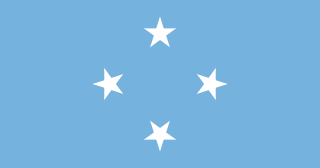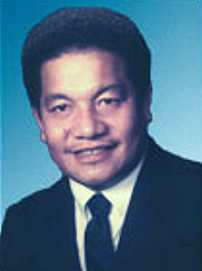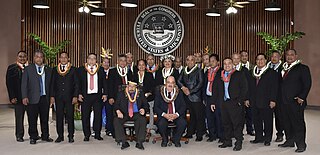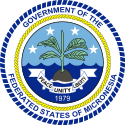
The Federated States of Micronesia, or simply Micronesia, is an island country in Micronesia, a subregion of Oceania. The federation consists of four states—from west to east, Yap, Chuuk, Pohnpei and Kosrae—that are spread across the western Pacific. Together, the states comprise around 607 islands that cover a longitudinal distance of almost 2,700 km (1,700 mi) just north of the equator. They lie northeast of Indonesia and Papua New Guinea, south of Guam and the Marianas, west of Nauru and the Marshall Islands, east of Palau and the Philippines, about 2,900 km (1,800 mi) north of eastern Australia, 3,400 km (2,100 mi) southeast of Japan, and some 4,000 km (2,485 mi) southwest of the main islands of the Hawaiian Islands.

The politics of the Federated States of Micronesia (FSM) takes place in a framework of a federal assembly-independent representative democratic republic. The President of the Federated States of Micronesia is both head of state and head of government. Executive power is exercised by the president and his cabinet, while legislative power is vested in both the president and the Congress. The judiciary is independent of the executive and the legislature.

The flag of the Federated States of Micronesia was adopted on 30 November 1978. The blue field represents the Pacific Ocean. In an echo of U.S. heraldic practice, the stars represent the four federated states: Chuuk, Pohnpei, Kosrae and Yap, arranged like the points of the compass.

Tosiwo Nakayama was the first President of the Federated States of Micronesia (FSM). He served two terms from 1979 until 1987.

John Richard Haglelgam is a Micronesian former politician who served as the second President of the Federated States of Micronesia.

Chuuk State is one of the four states of the Federated States of Micronesia (FSM). The other states are Kosrae State, Pohnpei State, and Yap State. It consists of several island groups: Namoneas, Faichuuk, the Hall Islands, Namonuito Atoll, Pattiw, and the Mortlock Islands. Chuuk is by far the FSM's most populous state, with 50,000 inhabitants on 120 square kilometers. Chuuk Lagoon is where most people live. Weno island, in the lagoon, is Chuuk's state capital and the country's biggest city. It may hold a referendum on independence in the near future, although this referendum has been repeatedly postponed.

The State of Yap is one of the four states of the Federated States of Micronesia, located in the westernmost portion of the country. The state borders Palau to the southwest, Guam to the north, and Chuuk State to the east. According to the state's population census carried out in 2020, the total population is 11,577 residing across a total area of 119.54 sq km, though a large majority of the area is water. The only town area in the state, Colonia, serves as the state capital.

Indirect presidential elections were held in the Federated States of Micronesia on May 11, 2007.

Parliamentary elections were held in the Federated States of Micronesia on 8 March 2011, alongside a three-part referendum. As there were no political parties, all 34 candidates ran as independents. For the first time in the country's history, two women ran for election, both in Chuuk State. However, neither was elected.
A referendum on the future status of the islands was held in the Trust Territory of the Pacific Islands on 8 July 1975. Voters were offered six options:
- Independence
- Commonwealth
- Free Association
- Statehood
- To retain the current status
- Another status

An independence referendum for Chuuk State to secede from the Federated States of Micronesia was originally scheduled to take place in March 2015. However, it has been delayed three times and it is uncertain if it will take place. The most populous of the four states within the FSM, Chuuk has high levels of unemployment and there are long-standing tensions over the distribution of funding within the FSM. Other concerns include political power within the federation and the preservation of cultural identity.

Parliamentary elections were held in the Federated States of Micronesia on 7 March 2017, alongside a referendum on allowing dual citizenship. Although the proposed constitutional amendment to allow dual citizenship was approved by a majority of voters, it did not pass the threshold of 75% voting in favour in at least three of the four states.

Constitutional Convention elections were held in the Federated States of Micronesia on 5 November 2019. The elections were held following a referendum in March 2019, in which 61% of voters voted in favour of calling a convention.

Parliamentary elections were held in the Federated States of Micronesia on 2 March 2021, to elect ten of the fourteen seats of the Congress of Micronesia for a two-year term. There are no political parties and all candidates stood as independents.

The Church of Jesus Christ of Latter-day Saints in the Federated States of Micronesia refers to the Church of Jesus Christ of Latter-day Saints and its members in the Federated States of Micronesia (FSM). The church's first known missionaries arrived on July 5, 1978. As of December 31, 2022, there were 5,966 members in 23 congregations in FSM. The LDS Church has congregations in every state in the FSM.

Parliamentary elections were held in the Federated States of Micronesia on 7 March 2023 to elect the fourteen members of the Congress: ten representatives of the districts, and four senators each representing one of the four states.

A referendum on nine proposed amendments to the constitution was held in Micronesia on 4 July 2023. Eight of the amendments were proposed by the Constitutional Convention elected in 2019, and one amendment was proposed by Congress. All nine amendments passed, and were officially ratified by President Simina on 4 October 2023.

The separatist movement in the Faichuk Islands is a political movement calling for autonomy and independence for the Faichuk Islands located in the state of Chuuk, in the Federated States of Micronesia, a federal country also made up of the states of Kosrae, Pohnpei and Yap.
The electoral districts of the Federated States of Micronesia are the divisions of Micronesian territory made in elections in the Federated States of Micronesia. These subdivisions are called "districts" in elections for the Congress of the Federated States of Micronesia. In elections for the State Legislatures of Kosrae, Pohnpei, Yap, and the State House of Representatives of Chuuk - there are named senatorial regions for their Senate elections. Local government of municipalities in the Federated States of Micronesia is carried out by elected officials chosen by the inhabitants.









